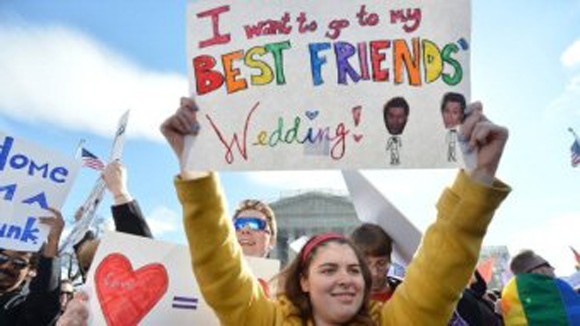
This week’s Essential Report affirms the broad and enduring support in the Australian electorate for legalising same-sex marriage. What’s less certain is which political tradition will claim the gay marriage legacy, writes Jackie Woods.
They say the test of a good idea is when someone repeats it back to you as their own.
If so, same-sex marriage passed with flying colours last week with NSW Premier Barry O’Farrell’s surprise endorsement on the grounds it was a snug fit with Liberal values.
As governments are swept along on the tide of public opinion and determined campaigns for change, there’s a growing sense that extending marriage rights to same-sex couples in Australia is just a matter of time.
What’s less certain is which political tradition will claim the gay marriage legacy. With politicians retrofitting their deepest convictions on the nature of love and families to the circumstances at hand, gay marriage may be a shoo-in (eventually) but the values the reform is said to embody are up for grabs.
Will it go down in history as a progressive social reform celebrating alternative ways of living and loving, or a conservative affirmation of the primacy of the family unit?
While support for gay marriage has long been considered a lefty issue and support is still stronger among left-leaning voters, the partisan divide is becoming much less clear-cut.
O’Farrell was just the first in a line-up of senior Liberals to respond to the New Zealand parliament’s passage of the same-sex marriage bill by reversing or softening their opposition to gay marriage, suggesting the party may move to a conscience vote post-election.
Although introduced by Labour, New Zealand’s same-sex marriage bill was enthusiastically supported by MPs from the governing National Party including prime minister John Key. France’s Socialist-led government is due to hold its final vote on same-sex marriage and adoption later today (Tuesday) as far-right protests rage in the streets. Meanwhile it is Britain’s Conservative Government driving the legalisation of gay marriage, with prime minister David Cameron declaring he supported gay marriage not despite but rather because of his conservatism.
In Australia, the leaders of the two major parties are increasingly the odd ones out in their personal insistence marriage should only be between a man and a woman, as more parliamentarians across the spectrum declare their support for marriage equality.
This week’s Essential Report affirms the broad and enduring support in the Australian electorate for legalising same-sex marriage.
Q. Do you think people of the same sex should or should not be allowed to marry?
Total Votes Vote Labor Vote Lib/Nat Vote Greens
Should be allowed to marry 54% 64% 42% 89%
Should not be allowed to marry 33% 26% 44% 3%
Don’t know 13% 10% 13% 8%
Solid levels of support have remained consistent over the past few years, with about half of voters expressing support and a third opposed. There is a significant partisan divide, with support strongest among Greens and weakest among Coalition voters who are almost evenly split between support and opposition, and Labor voters somewhere in the middle.
Unsurprisingly, support for gay marriage declines somewhat with age – although still more over-55s support than oppose gay marriage: 47 to 41 percent.
A far greater divide on the issue is gender.
Q. Do you think people of the same sex should or should not be allowed to marry?
Men Women
Should be allowed to marry 46% 62%
Should not be allowed to marry 40% 27%
Don’t know 14% 11%
Support for same-sex marriage is significantly stronger among women than men, a trend that has been consistent over time.
There may be broad support and strong views either way, but research suggests same-sex marriage isn’t a vote-changer.
Those Labor supporters disappointed with the Federal Government’s failure to deliver marriage equality – despite allowing MPs a conscience vote – tend to be socially progressive voters unlikely to vote Liberal, though it may drive some disaffected Labor traffic to the Greens.
But while not of itself a particular vote-changer, same sex marriage speaks to deep values around family and society, giving politicians the opportunity to articulate a bigger and more personal world view than is usually afforded in the hurly burly of policy debate.
That so many politicians across the spectrum are recognising and grabbing the opportunity to back a reform representing tolerance, optimism and inclusion – however they try to tie it to their political mast – must be a ray of rainbow-coloured light in a political landscape dominated by cynicism and mistrust.
The survey was conducted online from the April 18 to 21 and is based on 1,044 respondents.
Author: Jackie Woods
Publication: ABC The Drum
Publication Date: April 23 2013
